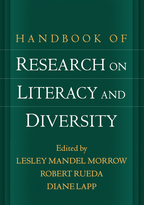Handbook of Research on Literacy and Diversity
Edited by Lesley Mandel Morrow, Robert Rueda, and Diane Lapp
Foreword by Edmund W. Gordon
Afterword by Eric J. Cooper
Paperback
Paperback
orderNovember 3, 2010
ISBN 9781609181451
Price: $63.00 464 Pages
Size: 7" x 10"
Copyright Date: 2009
“Recommended. Graduate, research, and professional collections.”

—Choice
“A welcome addition to the conversations that dominate contemporary literacy research and graduate studies....The extremely high quality of the contributions, the structure of each chapter, and the issues addressed make this book a 'must have' for literacy researchers and university professors. It is one I will use in my own graduate teaching and from which I will recommend specific chapters to teacher professional learning communities.”

—Educational Review
“Powerful. The editors have brought together brilliant researchers who make a tremendous contribution to building knowledge about instruction that capitalizes on students' social and cultural contexts. Perhaps most important, they point the way toward taking action that is evidence based and holds potential for making a difference in the literacy lives of our students.”

—Victoria J. Risko, EdD, Department of Teaching and Learning, Vanderbilt University
“A much-needed resource, this handbook addresses both the promises and challenges of working with the richly diverse students attending schools today. Respected scholars provide thorough overviews of existing research and theory, highlight what is still to be learned, and offer recommendations for educational policy and practice. Readers will find the focus on English language learners, minority students, and other marginalized groups particularly useful. This volume should be added to the reference shelves of all literacy researchers, and can offer a strong grounding for graduate coursework.”

—Kristen H. Perry, PhD, Department of Curriculum and Instruction, University of Kentucky
“This comprehensive volume challenges the deficit model of diversity and argues for a resource orientation toward difference that is essential to effective teaching for minority children. The book covers a wide range of critical concerns related to literacy and diversity, including policy issues, theoretical developments, instructional strategies, assessment, multiple literacies, social attitudes, and formal and informal learning. Addressing the complexities of the topic in a way that is invaluable, this is an important resource for teacher educators, graduate students, and university researchers, as well as inservice teachers.”

—Guofang Li, PhD, Department of Teacher Education, Michigan State University
—Choice
“A welcome addition to the conversations that dominate contemporary literacy research and graduate studies....The extremely high quality of the contributions, the structure of each chapter, and the issues addressed make this book a 'must have' for literacy researchers and university professors. It is one I will use in my own graduate teaching and from which I will recommend specific chapters to teacher professional learning communities.”
—Educational Review
“Powerful. The editors have brought together brilliant researchers who make a tremendous contribution to building knowledge about instruction that capitalizes on students' social and cultural contexts. Perhaps most important, they point the way toward taking action that is evidence based and holds potential for making a difference in the literacy lives of our students.”
—Victoria J. Risko, EdD, Department of Teaching and Learning, Vanderbilt University
“A much-needed resource, this handbook addresses both the promises and challenges of working with the richly diverse students attending schools today. Respected scholars provide thorough overviews of existing research and theory, highlight what is still to be learned, and offer recommendations for educational policy and practice. Readers will find the focus on English language learners, minority students, and other marginalized groups particularly useful. This volume should be added to the reference shelves of all literacy researchers, and can offer a strong grounding for graduate coursework.”
—Kristen H. Perry, PhD, Department of Curriculum and Instruction, University of Kentucky
“This comprehensive volume challenges the deficit model of diversity and argues for a resource orientation toward difference that is essential to effective teaching for minority children. The book covers a wide range of critical concerns related to literacy and diversity, including policy issues, theoretical developments, instructional strategies, assessment, multiple literacies, social attitudes, and formal and informal learning. Addressing the complexities of the topic in a way that is invaluable, this is an important resource for teacher educators, graduate students, and university researchers, as well as inservice teachers.”
—Guofang Li, PhD, Department of Teacher Education, Michigan State University



